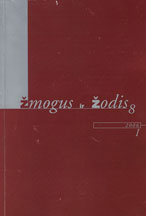Klitikų problema Alfonso Maldonio poezijoje
The Problem of Clitics in A. Maldonis Poetry
Author(s): Antanas Pakerys, Aušra BalčiūnaitėSubject(s): Poetry
Published by: Vytauto Didžiojo Universitetas
Keywords: clitics; potential clitics; syllabic-accentual versification; metre; poetical discourse
Summary/Abstract: Proclitics and enclitics have not been very well explored in Lithuanian poetry. Linguists, who studied Lithuanian (unpoetical) discource state that it is not possible to determine precisely, which words can be considered as clitics. The main goal of this work is to analyse, which words in poetry are usually adjoined to each other. The material of this research consists of A. Maldonis syllabic-accentual versification verses. On the basis of regular stressed and unstressed syllable recurrence in this versification, it is determined which words are stressed and which are not stressed. Statistic analysis based on these results has been performed. This research is not purely unprejudiced because in loudly declaimed poetry different accentuation laws can be shown. For this reason, another research was carried out: a dictaphone was used to record loudly declaimed poetry written by the same poet. Aurally (on the basis of answers listeners) it was determined, which words are stressed and which are not stressed. Statistical analysis, based on these results, has been made. Syllabic-accentual versification laws show that mostly monosyllabic prepositions (98%), conjunctions (98%), particles (91%), adverbs (86%) are adjoined. Less highly adjoined are pronouns (56%) and verbs (33%). Among disyllabic parts of speech, the mostly adjoined ones are prepositions (100%) and particles (78%). In A. Maldonis loudly declaimed poetry, monosyllabic prepositions (100%), conjunctions (99%), particles (85%) and adverbs (79%) are mostly adjoined. Less highly adjoined parts of speech are monosyllabic pronouns (50%) and verbs (25%). Among disyllabic parts of speech, prepositions (100%) and conjunctions (80%) are mostly adjoined.
Journal: Žmogus ir žodis
- Issue Year: 08/2006
- Issue No: 1
- Page Range: 10-14
- Page Count: 5
- Language: Lithuanian

